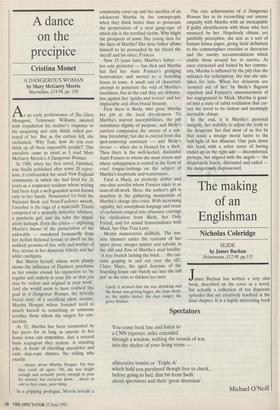A dance on the precipice
Cristina Monet
A DANGEROUS WOMAN by Mary McGarry Morris Macmillan, £14.99, pp. 358 At an early performance of The Glass Menagerie, Tennessee Williams awaited with trepidation his mother's response to his unsparing and only thinly veiled por- trayal of her. But as the curtain fell, she exclaimed, 'Why Tom, how do you ever think up all these impossible people?' This anecdote came to mind as I read Mary McGarry Morris's A Dangerous Woman.
In 1988, when her first novel, Vanished, was finally published after some 20 reject- ions, it confounded the small New England community in which she had lived for 26 years as a respected resident whose writing had been kept a well-guarded secret known only to her family. Nominated for both the National Book and Penn/Faulkner awards, Vanished is the saga of a makeshift Trinity composed of a mentally defective labourer, a psychotic girl, and the baby she impul- sively kidnaps. Even the critics — exploring Morris's theme of the persecution of the unlovable — wandered bemusedly from her hellish fictional terrain to dwell on the unlikely persona of this wife and mother of five, serene in her domestic felicity and her white cardigans.
But Morris herself, whose work plainly shows the influence of Flaubert, proclaims as her modus vivendi his injunction to 'be regular and orderly in your life so that you may be violent and original in your work'. And she would seem to have realised this goal in A Dangerous Woman, the lyrically brutal story of a sacrificial idiote savante, Martha Horgan, whose frenzied need to attach herself to something or someone terrifies those whom she targets for con- nection.
At 32, Martha has been tormented by her peers for as long as anyone in her home town can remember. Just a natural born scapegoat they reckon. A standing joke. A fount of chortling anecdotes and rude skip-rope rhymes. No telling why exactly:
... shame about Martha Horgan. On that they could all agree. Oh, she was bright enough and certainly pretty enough to pass for normal, but everyone knew... about as odd as they come, poor thing...
In a gripping prologue, Morris reveals a community cover-up and the sacrifice of an adolescent Martha by the townspeople when they think better than to prosecute the perpetrators of a near gang-rape of which she is the terrified victim. Why blight the prospects of some fine young men for the likes of Martha? Her dour father allows himself to be persuaded by his friend the sheriff and his sister, Frances.
Now 15 years later, Martha's father her sole protector — has died and Martha has fled her Aunt Frances's grudging benevolence and moved to a boarding house in town. A small cast of characters attempt to penetrate the void of Martha's loneliness, but in the end they are defence- less against her 'quirks and terrors' and her implacable and often brutal honesty.
First there is Birdy, who gives Martha her job at the local dry-cleaners. To Martha's starved susceptibilities, the job constitutes dignity of purpose, and Birdy's careless compassion the sweets of a sub- lime friendship; but she is evicted from this spot-removing sanctuary — and Birdy's favour — when she is blamed for a theft. Then there is the well-heeled, disdainful Aunt Frances to whom she must return and whose unhappiness is vented in the form of cruel tongue-lashings on the subject of Martha's ineptitude and wantonness.
Fatal is Mack, an alcoholic drifter and one-shot novelist whom Frances takes in as man-of-all-work. Here, the author's gift is manifest in the gathering momentum of Martha's charge into crisis. With increasing rapidity, her amorphous longings and sense of exclusion congeal into obsessive cravings for vindication from Birdy, her Only Friend, and for sexual transcendence with Mack, her One True Love.
Morris manoeuvres skillfully. The ten- sion simmers under the restraint of her spare prose; images sputter and subside in the ebb and flow of Martha's mad lucidity. `A tree branch lashing the brick. . . the cur- tains gasping in and out over the sill'; Claire Mayo, the aged doyenne of the boarding-house can 'barely see into the tall pot' as she tries to thicken her stew:
Lately it seemed that she was shrinking and the house was getting bigger, the steps steep- er, the nights darker, the days longer, the gravy thinner.
The rare achievement of A Dangerous Woman lies in its reconciling our uneasy empathy with Martha with an inescapable if guilty identification with those who feel menaced by her. Hopelessly obtuse, yet painfully perceptive, she acts as a sort of human litmus paper, giving lurid definition to the commonplace cruelties or decencies and the tawdry accommodations which enable those around her to survive. At once ostracised and baited by her commu- nity, Martha is inflamed by the pity that she mistakes for redemption; the lust she mis- takes for love. When her delusions are `scoured out of her' by Birdy's flagrant rejection and Frances's announcement of her engagement to Mack, Martha is goad- ed into a state of rabid retaliation that car- ries the novel to its violent and seemingly inevitable climax.
In the end, it is Martha's personal integrity, her inability to adjust the truth to the desperate lies that most of us live by that lends a strange moral lustre to the half-light of her illusions. One puts down this book with a sober sense of having ended up on the right side — discomforted, perhaps, but aligned with the angels — the desperately lonely, distrusted and exiled the dangerously dispossessed.


























































 Previous page
Previous page